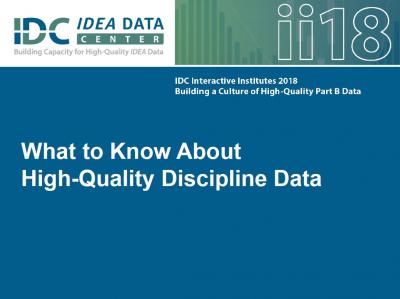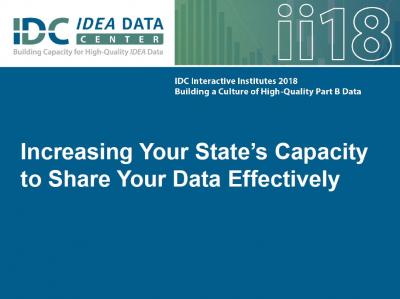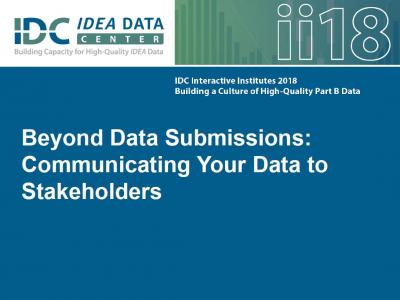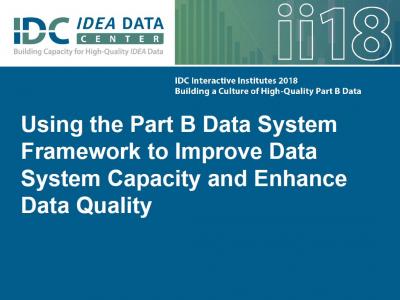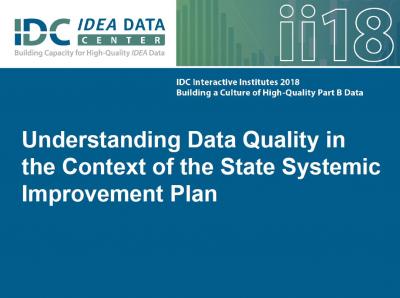Site Search
Results 15 - 21 of 57
Format: Presentations
What to Know About High-Quality Discipline DataThis session reviewed the working principles of high-quality IDEA data as they relate to the various discipline data states must submit each year for children and youth with disabilities. Discussion topics included how states make sure their data are accurate, timely, and complete. Presenters also discussed how states maintain discipline data security while making the data accessible and usable.
Format: Presentations
Increasing Your State’s Capacity to Share Your Data EffectivelyIn this workshop, states set the stage by telling a story of how they engage stakeholders using data visualization techniques for effective communication. Session presenters introduced the IDC Part B Indicator Data Display Wizard to help states create data displays quickly and easily using SPP/APR data. In an interactive activity, participants discussed their current experiences with data use and communication and how the IDC Part B Indicator Data Display Wizard can help them create or improve a state’s current data visualization and communication process.
Format: Presentations
Beyond Data Submissions: Communicating Your Data to StakeholdersThis session focused on how to best communicate high-quality data by applying different strategies to prepare data for dissemination and use. Topics covered in this session included the importance of understanding the audience, how stakeholder needs can vary when understanding and interpreting data, why data governance is a key component in planning data communication activities, and why accessibility is important. This session highlighted sections of the Data Use component of the IDEA Data Center Part B Data System Framework.
Format: Presentations
Using the Part B Data System Framework to Improve Data System Capacity and Enhance Data QualityThis session introduced the IDEA Data Center Part B Data System Framework as a tool to guide development of a coherent approach to improving data quality and data systems. The overall purpose of the framework and accompanying products is to allow states to assess progress toward valid collection, analysis, use, and reporting of Part B IDEA data. The presenter also presented and described a companion data system graphic.
Format: Presentations
Understanding Data Quality in the Context of the State Systemic Improvement PlanDuring this session, the presenter applied IDC’s working principles of high-quality data to the SSIP. The presenter focused on applying the principles of data quality at each step in the SSIP evaluation.
Format: Presentations
New Significant Disproportionality Regulations WebinarThis webinar focused on key components of the new significant disproportionality regulations presented in §20 U.S.C. 1418(d) and 34 CFR §§300.646 and 300.647. The regulations require states to determine whether significant disproportionality based on race/ethnicity is occurring with respect to the identification of children as children with disabilities, including identification as children with particular impairments; placement of children in particular educational settings; and incidence, duration, and type of disciplinary actions, including suspensions and expulsions. Timeline for state compliance is July 1, 2018, and states must make significant disproportionality determinations using new methodology during SY 2018-19. The webinar highlighted new OSEP Significant Disproportionality Resources and included resources that comprise IDC's Disproportionality and Equity Resource Collection. The webinar was part of IDC's Discipline Peer-to-Peer Exchange.
Format: Presentations
Equity, Inclusion, and Opportunity: Creating Educational Systems That Meet the Needs of All Groups of StudentsMany schools and districts have been identified as low performing or disproportionate because of disparities between subgroups on a variety of success measures. Other schools and districts are proactively trying to address identified success gaps. Presenters from IDC demonstrated IDC's Success Gaps Toolkit that can help schools and districts 1) prepare all of their students for success in college and careers by addressing success gaps, 2) collect and use quantitative and qualitative data for the purpose of root-cause analysis of those success gaps, and 3) focus attention on those root causes for the benefit of children and students in the lowest performing subgroups.


